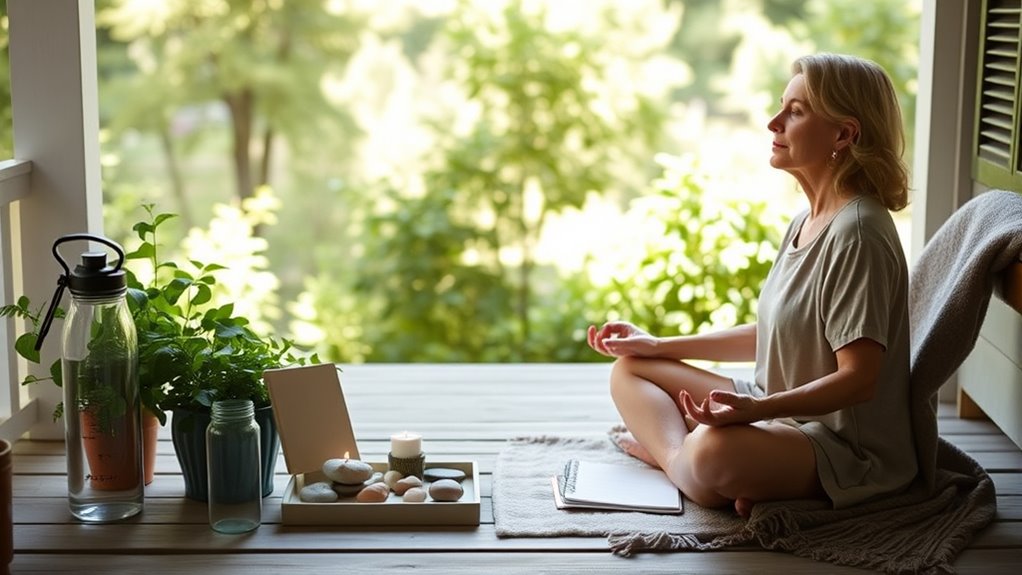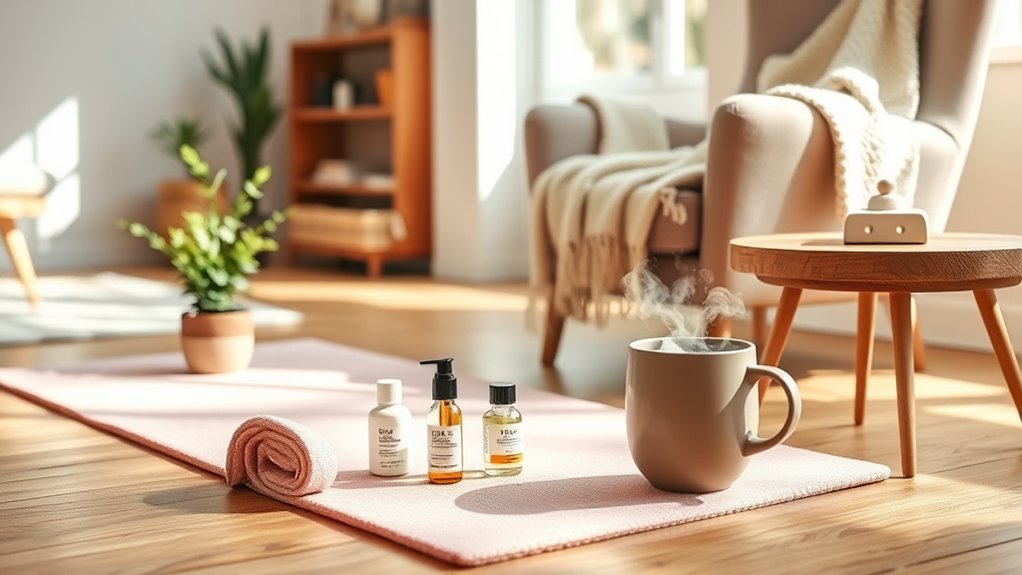To improve your caregiver self-care on a budget, focus on quick relaxation techniques like mindful breathing and gratitude journaling, which can be done anytime. Create a cozy space for reflection using simple decor and soft lighting. Use free online resources for support, stress management, and mental health tips. Incorporate short exercises like stretching or walking, and connect with community groups for emotional support. Setting clear boundaries helps protect your energy—keep exploring for more budget-friendly strategies to stay well.
Key Takeaways
- Practice quick, mindful breathing exercises during breaks to reduce stress without extra cost.
- Create a calming environment with affordable decor, soft lighting, and personal touches for relaxation.
- Use free online resources, support groups, and community forums for emotional support and guidance.
- Incorporate budget-friendly physical activities like stretching, walking, or resistance band exercises into daily routines.
- Establish routines and boundaries to protect your energy, ensuring sustainable self-care without overspending.
Prioritize Quick, Relaxing Breathing Exercises

When life gets hectic, taking a moment for quick, relaxing breathing exercises can make a significant difference. Practicing mindful breathing helps you stay grounded and reduces stress. Find a quiet space, sit comfortably, and focus on your breath. Inhale slowly through your nose, feeling your chest expand, then exhale gently through your mouth. Repeat this calming technique a few times, paying close attention to each breath. These short exercises can be done anywhere—during a break, in your car, or while waiting in line. They help clear your mind, lower anxiety, and restore energy. Incorporating mindful breathing into your daily routine is a simple, budget-friendly way to improve your overall well-being and maintain resilience amidst caregiving challenges. Practicing mindfulness can help you cut through the noise and cultivate a sense of calm in busy moments.
Create a Cozy Space for Rest and Reflection

Creating a cozy space for rest and reflection helps you recharge and find peace amid your busy days. Focus on choosing comfortable decor, soft lighting, and adding personal touches that make the space feel welcoming. These simple choices can make a big difference in giving you a restful retreat. Incorporating calming elements like gentle textures or soothing colors can further enhance your space’s restorative qualities.
Choose Comfortable Decor
A cozy, well-decorated space can make a significant difference in your ability to rest and reflect. When choosing decor, focus on comfort and simplicity, aligning with current decor trends that emphasize natural textures and calming elements. Select color palettes that promote relaxation, such as soft neutrals, gentle blues, or warm earth tones. These colors create a soothing atmosphere, helping you unwind after a busy day. Incorporate comfortable furniture, plush pillows, and soft blankets to enhance the space’s inviting feel. Avoid clutter by keeping decor minimal and purposeful. By choosing affordable, thoughtful pieces, you can transform your space into a peaceful retreat that encourages self-care and rejuvenation without breaking the bank. Additionally, selecting calming colors and materials can further support mental and emotional well-being.
Incorporate Soft Lighting
Soft lighting transforms your space into a calming refuge, making it easier to relax and reflect after a busy day. Using ambient illumination, like dimmable lamps or string lights, creates a soothing atmosphere that eases stress. This gentle light encourages mindfulness and helps you unwind, fostering emotional well-being. To evoke emotion, consider how your space feels when illuminated softly—warm, safe, and inviting. Incorporating ethical hacking principles, such as careful planning and setup, can help ensure your lighting choices support a secure and comfortable environment.
Add Personal Touches
Adding personal touches to your space transforms it into a cozy retreat where you can truly unwind and reflect. Incorporate sentimental touches like photos, keepsakes, or mementos that bring back happy memories. These items create a sense of comfort and familiarity, making your space feel uniquely yours. Developing personalized rituals, such as lighting a candle or playing calming music, can enhance your relaxation routine. Small adjustments, like arranging your favorite books or adding a soft blanket, make your environment inviting and soothing. By intentionally adding these personal elements, you foster a calming atmosphere that supports your mental well-being. Creating a space filled with sentimental touches and personalized rituals helps you recharge, so you’re better equipped to care for others.
Make Use of Free or Low-Cost Online Resources

Taking advantage of free or low-cost online resources can be a game-changer for caregivers seeking support and information. Many websites and apps offer guidance on maintaining mental health, helping you manage stress, anxiety, and burnout without added expense. You can access webinars, articles, and online support groups that provide emotional encouragement and practical advice. These resources also help improve your time management skills, offering tips to organize your day and prioritize self-care alongside caregiving duties. By utilizing free tools like meditation apps, online journals, and community forums, you create a supportive environment for yourself without straining your budget. Staying informed and connected online empowers you to care for your mental health more effectively, making your caregiving journey more sustainable and less overwhelming.
Incorporate Short, Affordable Physical Activities

Adding short, affordable physical activities into your day can boost your energy and mood. You might take quick stretch breaks, go for a walk outside, or try simple home workouts. These small steps make a big difference in keeping you active and refreshed. For those interested in enhancing vehicle performance, tuning options can be a cost-effective way to improve your car’s handling and efficiency.
Quick Stretch Breaks
Have you ever felt stiff or tired after long periods of caregiving? Quick stretch breaks can help you reduce stress and renew your energy. Just a few minutes of simple movements can make a big difference. For example, stretch your arms overhead, roll your shoulders, or do gentle neck stretches. To visualize, consider this table:
| Before Stretch | After Stretch |
|---|---|
| Tense shoulders, fatigue | Relaxed shoulders, refreshed |
| Stiff neck, discomfort | Loosened neck muscles |
| Low energy, sluggishness | Increased alertness |
| Stress buildup, tension | Calm, centered |
These small, affordable activities boost circulation, reduce muscle tension, and help you stay present. Incorporating hydration and nutrition into your routine can further enhance your energy levels.
Walk Outside Daily
Walking outside each day is one of the simplest and most effective ways to boost your physical and mental well-being. It requires no special equipment and costs nothing. As you walk, consider engaging in gardening therapy by tending to plants or simply appreciating nature’s beauty. This connection to nature can reduce stress and improve your mood. You might also try outdoor photography—capture the vibrant colors of flowers or the play of light on leaves. These activities encourage mindfulness and give you a creative outlet. Even a short walk around your neighborhood can make a difference, helping you feel more energized and centered. Incorporating these small, affordable outdoor activities into your daily routine supports your self-care without stretching your budget. Additionally, practicing mindfulness during outdoor activities can enhance the mental health benefits of your walks.
Home Workout Routines
Even busy caregivers can fit short, effective workouts into their day by focusing on quick, affordable exercises at home. You don’t need fancy equipment—resistance bands and bodyweight exercises are perfect for a budget-friendly routine. Spend 10-15 minutes doing bodyweight moves like squats, lunges, push-ups, and planks to strengthen key muscles. Resistance bands add variety and extra resistance, helping you build strength without spending money on gym memberships. You can do these exercises during small breaks or while multitasking, like watching TV or during a quick rest. Consistency is key, even if your sessions are brief. Incorporating necessary cookies can help monitor your progress and tailor your routines to your needs. These routines boost your energy, reduce stress, and improve overall well-being—all without leaving your home or breaking the bank.
Practice Mindfulness With Simple Techniques

Practicing mindfulness doesn’t require elaborate techniques or a lot of time; simple exercises can help you stay present and reduce stress. Try starting with mindfulness meditation by sitting quietly and focusing on your breath. When your mind wanders, gently bring your attention back to your breathing. Breathing techniques, such as deep inhales through your nose and slow exhales through your mouth, can quickly calm your nerves during hectic moments. You can practice these techniques anytime, whether you’re waiting in line or taking a short break. The goal is to anchor yourself in the present moment, helping to lower anxiety and improve overall well-being. Incorporating elements like deep breathing can also enhance skin health by reducing stress-related skin issues. With consistency, these small practices become powerful tools to support your mental health as a caregiver.
Connect With Supportive Communities and Networks

Connecting with supportive communities and networks can provide essential emotional relief and practical advice, helping you feel less isolated in your caregiving journey. Local support groups are a great way to meet others facing similar challenges, share experiences, and exchange useful tips—all without spending much. Online caregiver forums are equally valuable, offering round-the-clock access to advice and emotional support from a broad community. These platforms allow you to ask questions, vent frustrations, and gain perspective from people who truly understand your situation. Engaging regularly with these networks can boost your confidence and resilience, reminding you that you’re not alone. Building a sense of community is a powerful way to foster emotional well-being and share resources on a budget. Budget-friendly and accessible, joining local groups or online forums is a simple step toward strengthening your support system and caring for yourself.
Schedule Regular Moments of Gratitude

Scheduling regular moments of gratitude can considerably boost your emotional well-being as a caregiver. One effective way is through mindful journaling, where you pause daily to reflect on positive experiences. Gratitude journaling helps you focus on what’s going well, fostering a sense of appreciation despite challenges. Set aside a few minutes each day to write down things you’re thankful for, whether big or small. This practice shifts your mindset and cultivates resilience. You might find it helpful to keep your journal accessible, so you can jot down moments of gratitude whenever they occur. Over time, these regular reflections build a habit that strengthens your emotional health and provides a steady reminder of the good in your life, helping you stay grounded and motivated.
Use Budget-Friendly Self-Care Tools and Supplies

You can enhance your self-care routine without spending a lot of money by choosing budget-friendly tools and supplies. Simple items can make a big difference in your well-being. For example, affordable aromatherapy options like essential oils or diffusers help create a calming environment. Budget-friendly skincare, such as gentle cleansers and moisturizers, keeps you feeling refreshed without overspending. To visualize, consider this table:
| Item | Cost Range | Benefits |
|---|---|---|
| Essential Oils | $5–$15 | Relaxation, mood boost |
| Reusable Face Masks | $10–$20 | Hydration, skincare on a budget |
| Aromatherapy Diffuser | $15–$30 | Calm atmosphere, stress relief |
| Moisturizers | $8–$12 | Hydration, skin health |
These tools support your self-care without breaking the bank.
Set Boundaries to Protect Your Time and Energy

Setting clear boundaries is essential for safeguarding your time and energy amid caregiving responsibilities. When you set boundaries, you protect yourself from burnout and ensure you have time for self-care. Manage your energy by defining limits on what you can do each day, whether that’s setting specific hours for caregiving or saying no to additional tasks. Communicate these boundaries gently but firmly to others involved in care, so they understand your needs. Remember, managing energy isn’t about doing everything; it’s about prioritizing what truly matters and protecting your well-being. By establishing boundaries, you create a sustainable routine that supports both your caregiving duties and your personal health. This simple step can make a big difference in maintaining your resilience and happiness.
Frequently Asked Questions
How Can I Stay Motivated to Practice Self-Care Regularly?
To stay motivated to practice self-care regularly, create simple self-care routines that fit your schedule and remind yourself of their benefits. Use motivational strategies like setting small, achievable goals and rewarding yourself. Keep a journal to track your progress and reflect on how self-care improves your well-being. Remember, prioritizing your health makes you a better caregiver, so stay committed and be kind to yourself along the way.
What Are Some Quick Ways to Reduce Caregiver Stress During Busy Days?
When you’re busy, try quick relaxation techniques like deep breathing or stretching to lower stress instantly. Prioritize effective time management by scheduling small breaks or moments for yourself throughout the day. These simple steps help you stay calm and recharged, even on hectic days. Remember, taking a few minutes for relaxation and managing your time wisely can make a big difference in reducing caregiver stress quickly.
How Do I Find Affordable or Free Mental Health Support Options?
You can find affordable or free mental health support options by joining support groups in your community or online, which often offer free or low-cost options. Additionally, explore online counseling services that provide sliding scale fees or free sessions. Many organizations and nonprofits also offer resources or helplines specifically for caregivers. Taking advantage of these resources can help you access the support you need without straining your budget.
Can Small Self-Care Actions Really Make a Difference Over Time?
Imagine planting tiny seeds each day—those small self-care habits you do, like a moment of deep breathing or stretching, can grow into a healthier, more resilient you over time. Small improvements may seem minor, but they build momentum. Consistent, simple actions help reduce stress and boost your well-being. Yes, these small steps really do make a difference, gradually transforming your self-care routine into a powerful, sustaining force.
How Do I Balance My Caregiving Duties With My Personal Needs Effectively?
To balance your caregiving duties with personal needs, focus on time management by scheduling specific periods for self-care and responsibilities. Set clear boundaries to protect your personal time, saying no when necessary and requesting help from others. Prioritize tasks to avoid burnout, and remember that taking small moments for yourself can recharge you. Consistent boundary setting and effective time management help you maintain your well-being while caring for others.
Conclusion
Remember, caring for yourself is like tending a delicate garden—you need to water it regularly with small, meaningful acts. Each quick breath, cozy corner, or moment of gratitude is a seed that nurtures your resilience. By embracing these budget-friendly self-care practices, you’re planting hope and strength within. Over time, your well-being blossoms, allowing you to nurture others with a fuller, more vibrant heart. Keep tending your garden; your care makes all the difference.









